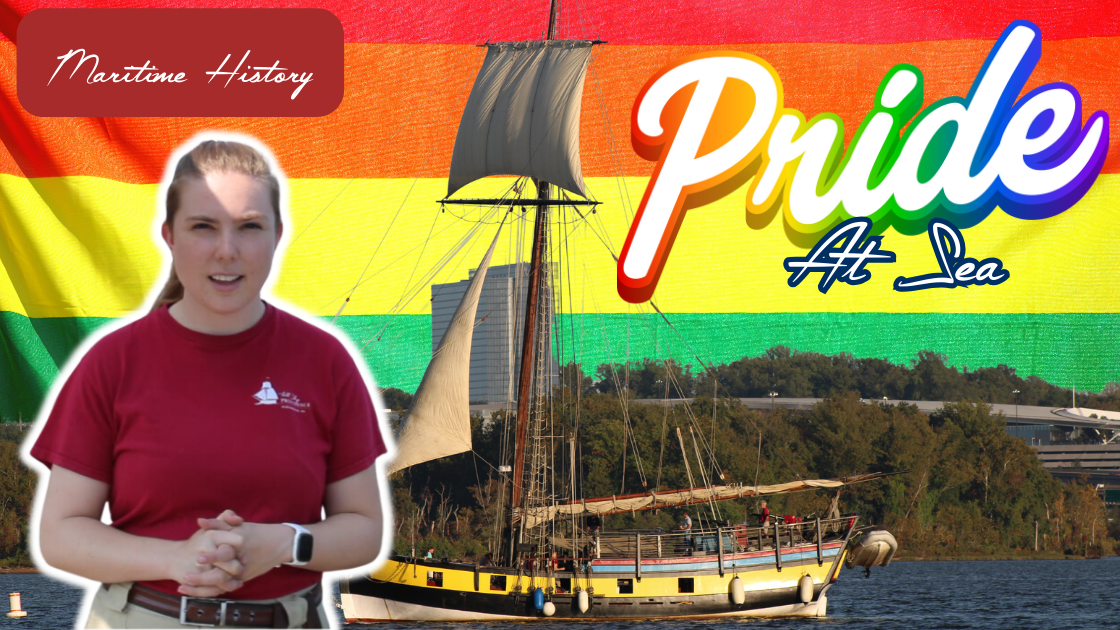
25 Jun Polari: The SEA-cret Gay Language
This #TallShipTuesday, we got a chance to dig into how and why the sea has been a home to LGBTQ+ people for hundreds of years. From the start, ships like Providence were places that those who were outcasts or not proper members of polite society could find a home. This legacy continued into the 20th century when the entire industry shifted. Queer Sailors created these thriving gay communities and families where there was safety to be themselves. These sailors knew that they would be accepted and amongst their people. It was in these queer spaces that a language emerged that allowed them to bond as a group, but also to keep themselves safe in a world that was hostile towards the LGBTQ+ community.
What is Polari?
Polari is a mix of several different languages, but has its roots in Thieves Cant. According to Baker and Stanley in Hello Sailor, the Hidden History of Gay Life at Sea, this language changed over time from Thieves Cant to one called Parlyaree used mostly by rogues and beggars. This then passed on to sailors due to English laws established around 1713. These laws made wandering for showmen, players, beggars, and peddlers illegal, but the laws didn’t make the same distinction for sailors. Thus many would pretend to be sailors to get around this law and sailors began to take on parts of Parlayree.
From there a Lexicographer in the 1950s named Eric Partridge put the split of Parlayree to our secret gay language, Polari at sometime in the 1800s. It happened along with the proliferation of theater in england and was centered around London. At this point the performing arts community used the language, not just the gay population (of which there were quite a few in the theater).
Polari was entirely a spoken language so most of the documentation of this language comes from relatively recently. “Polari draws from the ‘cant’ of travelling showmen and criminals, Italianate Lingua Franca picked up by men serving in the navy, the Romani language…, and the jargon of the theatrical community (amongst many other potential historical sources)” Polari was also influenced by british rhyme, backwards words, yiddish slang, and in later years, the american military led to the addition of quite a few words. (78-79, Baker and Stanley).
How did Polari make its way to sea?
Thieves Cant and Lingua Franca, both important languages to the creation of Polari were commonly spoken amongst sailors. While Polari was commonly spoken in the theater, that doesn’t mean that is entirely where it started. It may have been developed in combination between land and sea. It certainly was helped along by the crossover between performers and sailors. Polari became popular in the merchant navy when actors and theater performers would find their way onto passenger ships during the off season or in between jobs. From there sailors across different ships from the navy to the merchant service were making use of Polari.
Using Polari
This language allowed those in the know (gay seafarers) to talk about the queer world without those of the outgroup finding out or understanding what was being said. Scholar Anthony Hacket even posits that Polari for this reason was “a subversive act that enabled individuals to normalize a sub-cultural group.” So let’s learn a few of the words that this group used and see what they may have valued as a subcultural group as a result.
Pronouns
- He-She
- She-He
When referring to folks, they would have switched around the gender associated with each word. These words would have come in handy when talking about a partner in those days, making it seem as though one was talking about the opposite gender.
People
- Omi (homee)- man
- Palone- woman
- Omi-palone- gay man
- Palone-omi- lesbian
- Sea Queen- gay sailor.
- POLICE- Jennifer Justice, Betty Bracelets, Hilda Handcuffs, Lily Law
Language can tell you is what a community thinks is important. Like we have one word for love but in ancient greek there were several all describing different kinds of love. Well in a period of over policing of gay people, there are a plethora of words describing the police

They also had many of the words referred to body parts, clothes, makeup and the like. All were helpful in describing the things that were not socially acceptable for men or women of the era to be wearing in public.
Adjectives
- Bona, fantabulosa, dolly- good
- Tat, naff, cod- bad
- Camp, queeny, swishing, screaming dizzy- effeminate
- Butch- masculine
Acronyms
- TBH- to be had- available
- NTBH- not to be had- not available
- VAF- Vada! Absolutely Fantabulosa!
In the gay scene on land and at sea, Sailors passed down the language of polari from older queens to younger. They created this “family tradition” that they handed down through generations of seafarers. The found family and the bonds out at sea were strengthened by the language shared amongst them. Many words were given new context as a result of building this chosen family.
Family ties
- Mother- a mentor welcoming new gay men into the queer scene
- Sister(s)- a best friend (or sometimes an enemy)
- Auntie- an older, unattractive gay man
- Husband- masculine partner
The Revival and Legacy of Polari

Unfortunately, Polari is no longer spoken today. The LGBTQ+ community used it up until about the 1970s, when it fell out of the gay vernacular. Around this time, the language was becoming known outside of the ingroup, and thus was not as safe to use as it once was. From the 70s through the 80s, there is not much note of Polari outside of the occasional word or two used in meeting places and clubs. Today we see bits and pieces show up in “Gayspeak,” in LGBTQ+ Spaces, especially in the drag community. This however, again, only a few words and concepts.
In the 1990s, the sisters of perpetual indulgence, a group founded in 1978 to promote queer joy and liberation, decided to adopt polari as “the Language of the Occasion. It represented in itself a sacrament, revered and passed down from generation to generation of initiates. Yet it is more than a mystical language, half forgotten and only half-understood. It is also the language of irony and parody, as are the Sisters’ celebrations themselves.” Essentially, the sisters, ever camp that they are, decided to parody latin, finding another dead language to use. This one is from their community.
Video Sources (in order of mention in video)
- https://dictionary.cambridge.org/us/dictionary/english/age-of-sail
- https://www.youtube.com/watch?v=nYZQYmNXh2s
- https://www.merriam-webster.com/dictionary/socioeconomic
- https://www.taylorfrancis.com/books/mono/10.4324/9781315557991/french-language-british-literature-1756-1830-marcus-tomalin
- NAM Rodger, An Anatomy of the Georgian Navy
- https://www.history.navy.mil/content/history/nhhc/browse-by-topic/heritage/uniforms-and-personal-equipment/uniforms-1776-1783.html
- https://www.bbc.co.uk/history/british/empire_seapower/life_at_sea_01.shtml
- https://www.merriam-webster.com/dictionary/petty%20officer
- https://www.pbs.org/opb/historydetectives/feature/british-navy-impressment/#:~:text=Impressment%2C%20or%20%E2%80%9Cpress%20gang%E2%80%9D,a%20lack%20of%20qualified%20seamen.
- https://www.ipsos.com/sites/default/files/ct/news/documents/2021-06/LGBT%20Pride%202021%20Global%20Survey%20Report_3.pdf
- https://www.rmg.co.uk/whats-on/online/recovering-queer-history-britains-navy-age-sail
- https://www.alibris.com/search/books/isbn/9780582772144?invid=17960863132&utm_source=Google&utm_medium=cpc&utm_campaign=NMPi&gad_source=1&gclid=Cj0KCQjwsuSzBhCLARIsAIcdLm4oY8zaYheXC-wfbUUp_b8UPGkKoK4THLs6wtT2bAfU7uLSot8igecaAksKEALw_wcB&gclsrc=aw.ds
- https://navyhistory.org/2018/02/book-review-female-tars-women-aboard-ship-in-the-age-of-sail/
- https://journals.sagepub.com/doi/abs/10.1177/0843871415624624?journalCode=ijha
- https://www.youtube.com/watch?v=7FPRzH7Nrg4
- https://nyupress.org/9780814782248/rum-sodomy-and-the-lash/
- https://escholarship.org/content/qt7tm078mp/qt7tm078mp_noSplash_a8077fc26fc721d5dab689c3c45f6e03.pdf
- https://www.rmg.co.uk/stories/topics/shipbuilding-1800-present
- https://charlottedundas.com/the-charlotte-dundas/
- https://www.mentalfloss.com/article/86148/uncovering-thieves-cant-elizabethan-slang-underworld
- https://books.google.com/books/about/Fabulosa.html?id=vxWbDwAAQBAJ
- https://www.liverpoolmuseums.org.uk/stories/polari-and-hidden-history-of-gay-seafarers
- https://www.researchgate.net/publication/270105721_Queerly_Phrased_Language_Gender_and_Sexuality
- https://books.google.com/books?hl=en&lr=&id=1G_dVlJ2KhcC&oi=fnd&pg=PR11&dq=queerly+phrased+language+gender+and+sexuality&ots=4PYKmL74dJ&sig=hqs2o6h4f5uF5Jlsgc50nx_RqIA#v=onepage&q=polari&f=false
- https://www.academia.edu/1309968/Gayspeak_the_linguistic_fringe_Bona_polari_camp_queerspeak_and_beyond






Sorry, the comment form is closed at this time.